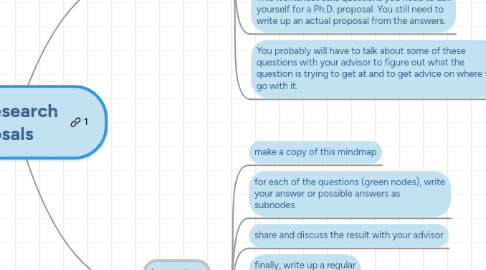
1. execution of the proposal
1.1. deliverables
1.1.1. What theorems are you going to prove?
1.1.2. What new algorithms are you planning on developing?
1.1.3. What experiments are you going to perform?
1.1.4. What are your criteria for success?
1.1.5. Are you going to build any software?
1.1.5.1. What will it do?
1.1.5.2. How big is it going to be (LOC)?
1.1.5.3. What language will you write it in?
1.1.5.4. How will it be available?
1.1.5.5. Will you have all the software / resources you need?
1.1.5.6. What libraries do you need?
1.1.6. Is there going to be an empirical evaluation?
1.1.6.1. What databases are you going to be using?
1.1.6.2. Have those databases been used by others?
1.1.6.3. Are those databases available?
1.1.6.4. What kind of improvement do you believe is possible in principle on that data? Why do you believe that?
1.2. timeline and milestones
1.2.1. milestones
1.2.1.1. 0.5 years
1.2.1.1.1. deliverables
1.2.1.1.2. expected publications
1.2.1.1.3. sources of risk
1.2.1.1.4. contingency plans
1.2.1.2. 1 year
1.2.1.2.1. deliverables
1.2.1.2.2. expected publications
1.2.1.2.3. sources of risk
1.2.1.2.4. contingency plans
1.2.1.3. 1.5 years
1.2.1.3.1. deliverables
1.2.1.3.2. expected publications
1.2.1.3.3. sources of risk
1.2.1.3.4. contingency plans
1.2.1.4. 2 years
1.2.1.4.1. deliverables
1.2.1.4.2. expected publications
1.2.1.4.3. sources of risk
1.2.1.4.4. contingency plans
1.2.1.5. 2.5 years
1.2.1.5.1. deliverables
1.2.1.5.2. expected publications
1.2.1.5.3. sources of risk
1.2.1.5.4. contingency plans
1.2.1.6. 3 years
1.2.1.6.1. deliverables
1.2.1.6.2. expected publications
1.2.1.6.3. sources of risk
1.2.1.6.4. contingency plans
1.3. additional questions
1.3.1. Is the proposal ambitious enough? I.e., is this topic sufficient interesting and innovative for a proposal?
1.3.2. Is the proposal too ambitious? I.e. is there a high risk of failure?
1.3.3. What other time commitments do you have that may affect your ability to complete the research?
2. research
2.1. title
2.1.1. Pick a descriptive title.
2.2. background
2.2.1. What general field is this in? (Neural networks, document analysis, machine learning, ...)
2.2.2. What are currently the three hottest topics in that field (even if they are different from your thesis topic)?
2.2.3. What are the 3 major journals/conferences where you can publish your resaerch?
2.2.3.1. journals
2.2.3.1.1. 1
2.2.3.1.2. 2
2.2.3.1.3. 3
2.2.3.2. conferences
2.2.3.2.1. 1
2.2.3.2.2. 2
2.2.3.2.3. 3
2.3. topic
2.3.1. What is the question you are trying to answer? What is the hypothesis you are trying to prove/disprove?
2.3.1.1. 1
2.3.1.2. 2
2.3.1.3. 3
2.3.2. Why is solving that problem important?
2.3.3. What is the expected impact on academic research? I.e. how will other researchers build on your work and cte it?
2.3.4. What is the expected real-world impact of you work? I.e., will your work lead to new products or applications?
2.4. approach
2.4.1. What are the three most important pre-existing publications that your work builds on?
2.4.1.1. 1
2.4.1.2. 2
2.4.1.3. 3
2.4.2. Describe how your work builds on prior work.
2.4.3. What prior work have YOU done in the area?
2.4.4. What approach are you taking?
2.4.5. What is different about your approach from other approaches?
2.4.6. Why haven't other people taken that approach yet?
2.4.7. What are your criteria for success? I.e., how will you show that you have made an actual contribution?
2.4.8. scroll to the right to continue
3. instructions
3.1. make a copy of this mindmap
3.2. for each of the questions (green nodes), write your answer or possible answers as subnodes
3.3. share and discuss the result with your advisor
3.4. finally, write up a regular written Ph.D. proposal
3.5. scroll to the right to continue
4. background
4.1. A Ph.D. proposal should generally be worked out in collaboration with the faculty member you will be studying with.
4.2. Ph.D. proposals serve multiple purposes.
4.2.1. Admissions into a graduate program.
4.2.2. Acceptance by a Ph.D. advisor.
4.2.3. Application for financial support.
4.2.4. Guideline and preparation for research
